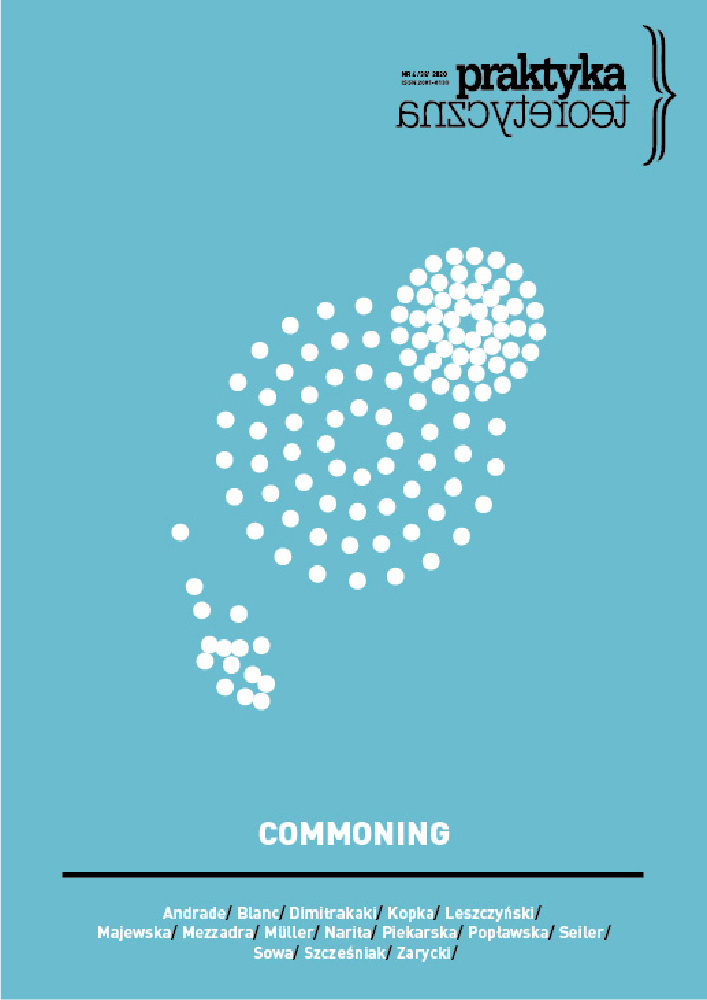Abstrakt
W pierwszej części tekstu przedstawiono wspierającą opinię o koncepcji „Globalnego wschodu” Martina Müllera jako przekonującej propozycji użytecznego narzędzia rozwoju studiów krytycznych nad tzw. światem post-komunistycznym czy też dawnym drugim światem w perspektywie globalnej. W pozostałej części komentarza wymieniono jednak szereg powodów dla których wdrożenie danej koncepcji napotkać może poważne bariery. Należą do nich po pierwsze możliwy opór w krajach Europy Środkowej i Wschodniej oraz szersze przyczyny strukturalne ze względu na które wprowadzenie do międzynarodowego obiegu koncepcji równoległej do „Globalnego południa” może być problematyczne. Wśród omówionych krótko podobnych problemów z prowadzeniem nowych koncepcji teoretycznych przedyskutowano doświadczenia złożonej i nie zawsze entuzjastycznej recepcji teorii post-kolonialnej w Polsce.
Bibliografia
Böröcz, József. 2006. “Goodness Is Elsewhere: The Rule of European Difference”. Comparative Studies in Society and History 48(1): 110–138.
de Sousa Santos, Boaventura and Maria Paula Meneses. 2020. “Introduction: Epistemologies of the South—Giving Voice to the Diversity of the South”. In Knowledges born in the struggle: Constructing the Epistemologies of the Global South, ed. Boaventura de Sousa Santos and Maria Paula Meneses. London: Routledge.
Ginelli, Zoltán. 2018. “Hungarian Experts in Nkrumah’s Ghana: Decolonization and Semiperipheral Postcoloniality in Socialist Hungary”. Mezosfera.org, May http://mezosfera.org/hungarian-experts-in-nkrumahs-ghana.
Haszczyński, Jerzy. 2020. “Polski pomnik, niemieckie wątpliwości”. Rzeczpospolita, 11 June.
Luxemburg, Rosa. 1898. Die Industrielle Entwicklung Polens. Leipzig: Duncker & Humblot.
Mark, James, Artemy M. Kalinovsky, and Steffi Marung (eds.). 2020. Alternative Globalizations: Eastern Europe and the Postcolonial World. Bloomington: Indiana University Press.
Melegh, Attila. 2006. On the East-West Slope: Globalization, Narration, Racism and Discourses on Central and Eastern Europe. Budapest–New York: CEU Press.
Myant, Martin. 2018. “Dependent capitalism and the middle-income trap in Europe and East Central Europe”. International Journal of Management and Economics 54(4): 291–303.
Snochowska-Gonzalez, Claudia. 2012. “Post-colonial Poland – On an Unavoidable Misuse”. East European Politics & Societies 26(4): 708–723.
Waldstein, Maxim. 2010. “Theorizing the Second World: Challenges and Prospects”. Ab Imperio 1: 98–117.
Wolff, Larry. 1994. Inventing Eastern Europe: The Map of Civilization on the Mind of the Enlightenment. Stanford, CA: Stanford University Press.
Zarycki, Tomasz. 2014. Ideologies of Eastness in Central and Eastern Europe. London: Routledge.
Licencja
Autorzy:
„Praktyka Teoretyczna” jest pismem, które chce realizować idee wolnego dostępu do wiedzy i poszerzania domeny dobra wspólnego. Ma służyć rozwojowi nauki i krytycznej refleksji w Polsce i na świecie w imię idei wolnego dostępu do wiedzy (Open Access). Całe pismo jest udostępniane za darmo w Internecie na warunkach licencji CC-BY-NC-SA (Uznanie autorstwa-Użycie niekomercyjne-Na tych samych warunkach 4.0 Międzynarodowe) w wersji 4.0 (szczegółowe warunki: http://creativecommons.org/licenses/by-nc-sa/4.0/). Artykuły w nim zamieszczone mogą być dowolnie przechowywane, kopiowane, drukowane, rozpowszechniane i wykorzystywane do celów naukowo-dydaktycznych przy zachowaniu warunków licencji. Apelujemy tylko o uznanie autorstwa i podanie źródła w myśl przyjętych w środowisku naukowym standardów.
Nie ma natomiast możliwości komercyjnego wykorzystania zgromadzonych zasobów bez pisemnej zgody wydawcy. Dostęp do czasopisma nie może być dystrybuowany za opłatą czy w jakikolwiek inny sposób limitowany przez inne podmioty.
Autorzy tekstów przyjętych do publikacji w czasopiśmie „Praktyka Teoretyczna” są zobowiązani do wypełnienia, podpisania i odesłania na adres redakcji umowy o udzielenie nieodpłatnej licencji do utworów, z zobowiązaniem do udzielania sublicencji CC [PL.pdf, PL.doc, EN.pdf, EN.doc].
Zgodnie z umową, autorzy tekstów opublikowanych w czasopiśmie „Praktyka Teoretyczna” udzielają wydawcy czasopisma niewyłącznej i nieodpłatnej licencji oraz zezwalają na użycie sublicencji Creative Commons Uznanie autorstwa-Użycie niekomercyjne-Na tych samych warunkach 4.0 Międzynarodowe (CC-BY-NC-SA 4.0).
Autorzy zachowują prawa do dalszego, swobodnego rozporządzania utworem.
Autorzy nadsyłanych artykułów powinni upewnić się, czy wykorzystywane przez nich materiały nie są chronione prawami autorskimi na rzecz innych osób i ponoszą odpowiedzialność za ewentualne uchybienia w tym względzie.
